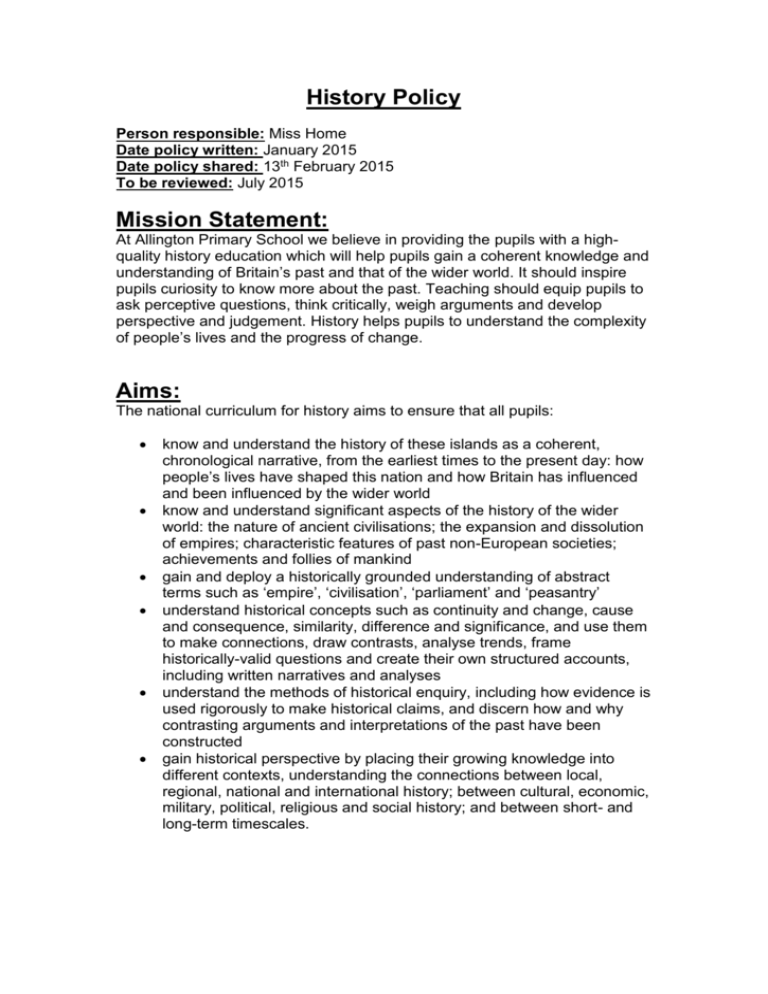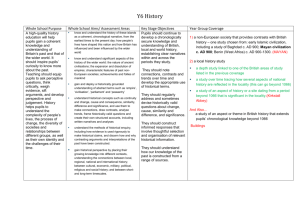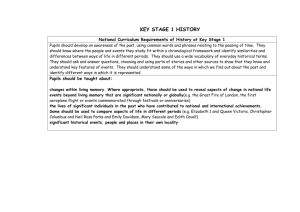History Policy- revised 2015
advertisement

History Policy Person responsible: Miss Home Date policy written: January 2015 Date policy shared: 13th February 2015 To be reviewed: July 2015 Mission Statement: At Allington Primary School we believe in providing the pupils with a highquality history education which will help pupils gain a coherent knowledge and understanding of Britain’s past and that of the wider world. It should inspire pupils curiosity to know more about the past. Teaching should equip pupils to ask perceptive questions, think critically, weigh arguments and develop perspective and judgement. History helps pupils to understand the complexity of people’s lives and the progress of change. Aims: The national curriculum for history aims to ensure that all pupils: know and understand the history of these islands as a coherent, chronological narrative, from the earliest times to the present day: how people’s lives have shaped this nation and how Britain has influenced and been influenced by the wider world know and understand significant aspects of the history of the wider world: the nature of ancient civilisations; the expansion and dissolution of empires; characteristic features of past non-European societies; achievements and follies of mankind gain and deploy a historically grounded understanding of abstract terms such as ‘empire’, ‘civilisation’, ‘parliament’ and ‘peasantry’ understand historical concepts such as continuity and change, cause and consequence, similarity, difference and significance, and use them to make connections, draw contrasts, analyse trends, frame historically-valid questions and create their own structured accounts, including written narratives and analyses understand the methods of historical enquiry, including how evidence is used rigorously to make historical claims, and discern how and why contrasting arguments and interpretations of the past have been constructed gain historical perspective by placing their growing knowledge into different contexts, understanding the connections between local, regional, national and international history; between cultural, economic, military, political, religious and social history; and between short- and long-term timescales. Subject content Key Stage 1 Pupils should develop an awareness of the past, using common words and phrases relating to the passing of time. They should know where the people and events they study fit within a chronological framework and identify similarities and differences between ways of life in different periods. They should use a wide vocabulary of everyday historical terms. They should ask and answer questions, choosing and using parts of stories and other sources to show that they know and understand key features of events. They should understand some of the ways in which we find out about the past and identify different ways in which it is represented. At Allington we strive the cover these objectives in our cross-curricular topics throughout the school. Year 1 coverage: Terms 1 & 2 Water topic. Events beyond living memory- History of the RNLI Lives of significant individuals that have contributed to national achievements- Grace Darling Changes in living memory- How boats have changed. Terms 3 & 4 Castles topic Significant historical places in their locality- Castles in Kent; focusing on Allington, Leeds, Dover, Bodiam and Rochester. Where they were built and why. Events beyond living memory- Castles, when they were built, name features of a castle, who lived in a castle, jobs and role within a castle, attacking and defending. Terms 5 & 6 Fit for life topic Significant historical people- Roger Bannister. Changes within living memory- 2012 Olympics and its legacy. Famous people- Mo Farrah. Events beyond living memory that are significant nationally or globallyHistory of medicine, Florence Nightingale, Mary Seacole, Edith Cavell. Year 2 coverage: Terms 1 & 2 Britain/India topic Changes in living memory- Museum of Kent Life, how food, clothing, technology have changed in 100 years. Examine rationing and food now compare to the war. Family history (Geography link). Changes in India in past 100 years. Terms 3 & 4 Explorers topic Lives of significant individuals in the past who have contributed to national and international achievements- Study lives and explorations of explorer from the past, Robert Falcon Scott, and a present day explorer, Neil Armstrong. Events beyond living memory that are significant globally-space exploration, first man on the moon and South Pole. Terms 5 & 6 Whose world is it? Events beyond living memory that are significant nationally or globallyGreat Fire of London- facts, causes, Samuel Pepys, St Pauls Cathedral, London Landmarks. Changes in houses/ fire brigade. Key Stage 2 Pupils should continue to develop a chronologically secure knowledge and understanding of British, local and world history, establishing clear narratives within and across the periods they study. They should note connections, contrasts and trends over time and develop the appropriate use of historical terms. They should regularly address and sometimes devise historically valid questions about change, cause, similarity and difference, and significance. They should construct informed responses that involve thoughtful selection and organisation of relevant historical information. They should understand how our knowledge of the past is constructed from a range of sources. Year 3 coverage: Terms 1 & 2 Tudors- Study of an aspect or theme in British history beyond 1066. Local history- A study of an aspect of history or a site dating from a period beyond 1066 that is significant in the locality- Allington Castle and Maidstone focus. Terms 5 & 6 Egyptians-The achievements of an earliest civilization- an overview of where and when the first civilisation appeared and a depth study of Ancient Egypt. Year 4 coverage: Terms 1 & 2 Why have people invaded and settled in the past? A Roman and Celt case study- The roman empire and it’ impact on Britain (i.e. Julia Caesar’s invasion 55-54BC, Roman empire & power, Hadrian’s Wall, British resistance, ‘Romanisation of Britain etc) Terms 3 & 4 What was it like for children in the Second World War? A study of an aspect or theme in British history that extends children’s chronological knowledge beyond 1066- a significant turning point in British history, for example, WW2. Terms 5 & 6 (Non-European) Mayan contrast to British history- A Non-European society that provides contrasts with British history- Mayan civilisation c. AD900 Year 5 coverage: Terms 1 & 2 Invaders and settlers -The Vikings and Anglo-Saxons struggle for the kingdom of England to the time of Edward the Confessor (i.e. Viking raids and invasions, Anglo-Saxon laws and justice, Edward the Confessor etc) Roman withdrawal from Britain & fall of Western Roman Empire, Scots invasion from Ireland to Scotland, Anglo-Saxon invasions, settlements, art and culture. Terms 5 & 6 The Victorians - A study of an aspect or theme in British history that extends children’s chronological knowledge beyond 1066 Year 6 coverage: Greeks - Ancient Greece- a study of Greek life and achievements and their influence on the Western World Key skills in History Key stage 1 1. Chronological understanding- know where people & events fit within chronological order. Develop an awareness of the past & passing of time. 2. Vocabulary- use wide vocabulary of everyday historical terms. 3. Processes- use parts of stories & other sources to show that they know & understand key features. 4. Differences –between ways of life at different times (inc similarities) 5. Representation- identify different ways the past is represented. 6. Historical enquiry – understand some of the ways we find out about the past. 7. Questioning – ask & answer questions about the past. Key stage 2 1. Chronological understanding- develop a chronologically secure knowledge and understanding. 2. Vocabulary- develop the appropriate use of historical terms. 3. Features of the past- know and understand how significant aspects of history; nature of ancient civilisations; expansions & dissolution of empires; characteristics features of the past non-European societies. 4. Diversity –Gain historical perspective by placing their growing knowledge into different contexts. 5. Causes- Questions about change, cause, similarity and difference, and significance. 6. Links – Note connections, contrasts and trends over time. Establish clear narratives within and across periods of time. 7. Historical interpretation – Understand how our knowledge of the past is constructed from a range of sources and those different versions of past events may exist, giving some reasons for this. 8. Historical enquiry – Understand the methods of historical enquiry, how evidence is used to make historical claims discern how & why contrasting arguments & interruptions of the past have been constructed. 9. Questioning – Regularly address and sometimes devise historically valid questions. 10. Organise – Construct informed responses that involve thoughtful selection and organisation of relevant historical information. 11. Communicate– Make connections, draw contrasts, analyse trends, frame historically- valid questions and create their own structured accounts, including written narratives and analyses. Roles and responsibilities The Head Teacher will be responsible for: reporting to the Governors about any monitoring that has taken place developing the monitoring policy supporting the History Co-ordinator allocating the budget The History Co-ordinator will be responsible for: reviewing the coverage of the curriculum and ensuring that the objectives are being met through our varied cross-curricular approach ensuring that there is progression through the school ensuring the effective teaching of History throughout the school and monitoring as outlined in the Monitoring Policy auditing, organising and purchasing History resources organising trips and visitors for the school. offering support and advice on possible teaching activities to all staff informing staff of relevant courses etc to encourage personal professional development Class Teachers will be responsible for: including effective History teaching activities in their short and medium term planning striving to include the key objectives in their planning to ensure progression. setting clear objectives, success criteria and assessing pupil’s work informing the History Co-ordinator of any resource requirements Equal Opportunities All children should have equal access to the History curriculum in line with the school’s Equal Opportunities Policy. All activities are offered to boys and girls. Work from all cultures/countries will be provided and the children will be given opportunity to discuss. Teachers will aim to provide effective learning opportunities by: setting suitable learning challenges responding to children’s learning needs overcoming potential barriers to learning and assessment for individuals and groups of children. Special Needs 1. Opportunities will be provided for children with learning difficulties through differentiation in planning. 2. More able children will have extension activities. 3. The needs of children with physical disabilities will be taken into consideration when planning work. 4. Parents will be encouraged to take their children to museums/local sites to look at examples of History. 5. Children will be encouraged to reflect and develop their work. The SENCO and the Co-ordinator will try to advise teachers on the activities relevant to pupils with Special Educational Needs. Monitoring and Review The teaching of History will be monitored by the History coordinator and will include feeding back to the class teacher and Head Teacher. A standard format will be used. Monitoring will be carried out in the form of observation, speaking to the children and evaluating their books, looking at displays and scrutinising teacher’s planning. Governors will work alongside the cocoordinator to ensure the policy is being followed to successfully deliver the planned outcomes. The monitoring will be used to identify staff development needs and ensure a range of appropriate resources are provided. In addition to this, monitoring will be used to ensure effective learning for all children. This policy is reviewed on a regular basis as part of our ongoing curriculum monitoring programme unless national initiatives deem it necessary to review it earlier.




![afl_mat[1]](http://s2.studylib.net/store/data/005387843_1-8371eaaba182de7da429cb4369cd28fc-300x300.png)



